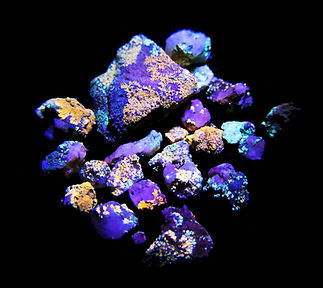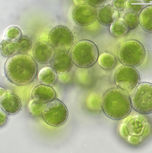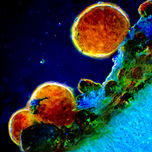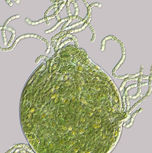

Cyanobacteria as
Master Builders

Our interdisciplinary project focuses on the development of cement-free living building materials made with the clacification properties of cyanobacteria from cave environments.
Goals
In view of climate change and the industrial revolution towards greater sustainability, the biotechnological use of algae offers a promising alternative to bacteria. Cyanobacteria - a special group of algae - are characterised by their photosynthetic and CO2-binding properties.
In the research project "Cyanobacteria as master builders", previously unknown species of algae are used, which form solid, crystalline shell structures of calcium carbonate (CaCO3) in their natural habitat. Biological cementation is reinforced by bonding with the algae's mucilage, which in combination offers great potential for the production of new materials using biotechnological processes.
The interdisciplinary team of phycologists (Patrick Jung, Laura Briegel-Williams) and civil engineers (Carina Neff, Jan Friedek) from the University of Applied Sciences Kaiserslautern, natural product analysts (Lena Keller, Julia Hale) from DLR - Weincampus Neustadt and soil scientists (Georg Guggenberger, Stefan Dultz) from the Institute of Soil Science at the Leibniz University Hannover has therefore set itself the goal of utilising the lime-embedding properties of these algae to produce hybrid materials such as living concrete.
Our interdisciplinary team already published its first article about calcification of terrestrial cyanobacteria, the core process for the project: Jung et al. (2024). Hard shell, soft blue-green core: ecology, processes and modern applications of calcification in terrestrial cyanobacteria. iScience.
The project was funded by the Carl Zeiss Foundation with €750,000 over two years.
Website: Carl-Zeiss WildCard

Grit Life
My main research project is called 'Grit Life' funded by the German Research Foundation (DFG) and aims to uncover a novel and unique soil bound microbiological biocenosis called Grit Crust in the Atacama Desert of Chile, South America.
The project started in September 2021 and will last for three years. It is funded with 400.000 € by DFG.














